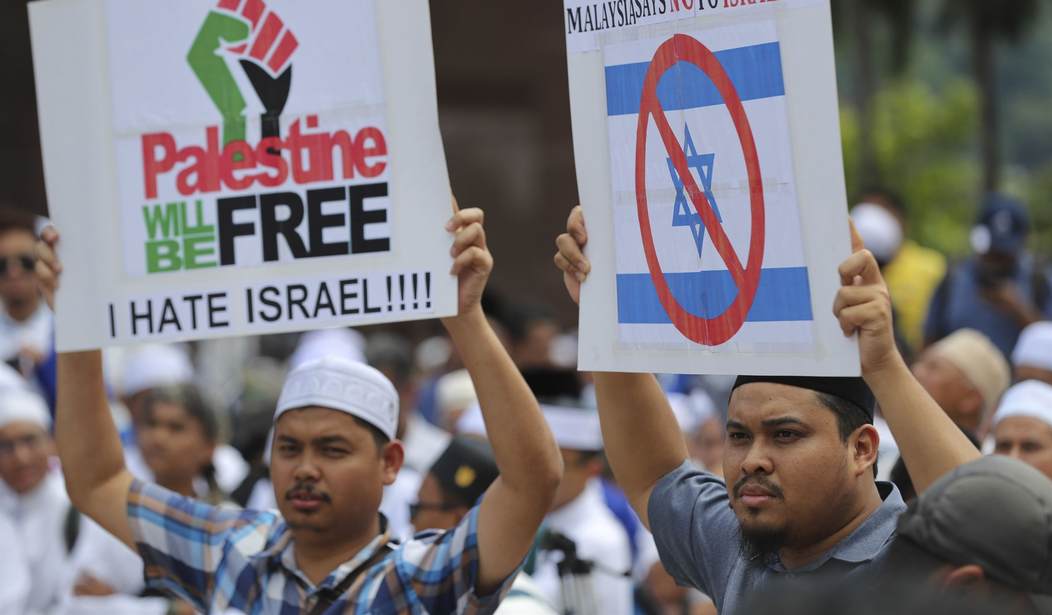Here’s a story featured by the Free Beacon today that demonstrates how complicated the situation inside Israel and across the Middle East can be. Many of us probably think of the region as a powder keg pitting Israel against her Arab neighbors, most of whom only sullenly tolerate Israel because of its support from the United States and the West. More broadly, we might see it as a standoff between the Jews and the Muslims. But what about all of the Arabs living inside of Israel? There are more than some might imagine, comprising roughly 20% of the population. How do they manage to get along inside the Jewish state? As it turns out, most of them do surprisingly well. Many are citizens and they don’t feel like they need Hamas to “liberate” them from Israel. In fact, since the attacks of October 7, support for Israel among Arab Israelis is reportedly surging and that reality is showing up in the debates taking place among commentators and on social media.
Palestinians and their allies have justified and even celebrated Hamas’s Oct. 7 massacre in Israel as a blow against Jewish oppression. But the 2 million Arab citizens of Israel have overwhelmingly responded by drawing closer to the Jewish state.
Among Arab Israelis, prominent media personalities have helped lead an unprecedented surge in support for their country and opposition to their self-proclaimed liberator Hamas. Pro-Israel arguments that were previously almost unspeakable in the Arab mainstream have in recent weeks gotten a respectful hearing.
Yoseph Haddad, a 38-year-old Christian Arab influencer, has skyrocketed to fame in Israel with his outspoken advocacy for the country in Hebrew, Arabic, and English. Haddad told CNN on Oct. 22 that Hamas’s attack was a wakeup call for the Arabs who constitute about 20 percent of Israel’s population.
The Arab “influencer” quoted above described the attacks as a reminder of how bad things could be if Hamas succeeded in overthrowing Israel. “We don’t want to live under a terrorist organization. We want to live in a democracy, and that’s what the state of Israel is.’”
Another Arab influencer declared himself to be “Israeli first and Palestinian second.” You can read a rather lengthy post of his on Twitter where he explains the evolution of his identity. He grew up thinking of himself as a “Palestinian Israeli.” But Hamas has shown him that he can’t remain in that mold forever. He now calls himself an “Israeli Palestinian.” That may seem like a small distinction, but it’s not. He explains how and why he doesn’t wish to live under a Palestinian government, particularly one run by Hamas. He has only one home and that home is Israel.
A recent survey from Hebrew University found that 77% of Arabs opposed Hamas’s attack on Oct. 7. 66% believe Israel has the right to defend itself. It’s not a universal sentiment, but it clearly shows that the dividing lines in Israeli society are not nearly as clear or stark as we might assume. And as with all societies in the world, you almost have to spend some time soaking in the culture before drawing conclusions or making generalizations. As I said at the top… it’s complicated.
This doesn’t mean that the ongoing troubles are about to suddenly end and all of the Jews and all of the Arabs will be walking arm in arm toward a permanent peace in the region. That’s hardly the case. But you take progress where you can get it. Remember that it’s “only” been 75 years since the official creation of the modering state of Israel and the first Arab-Israeli war. That’s a “lifetime” in one regard, but it’s a flash in the pan in historical terms. Are the changes we’re seeing today the early signs that we may be moving toward a world where the Arabs finally simply accept the existence of Israel and the right of the Jewish people to coexist with them in the region? It’s a lovely dream, and my inner optimist wants to believe that it might become reality, even if I don’t live to see it.








Join the conversation as a VIP Member